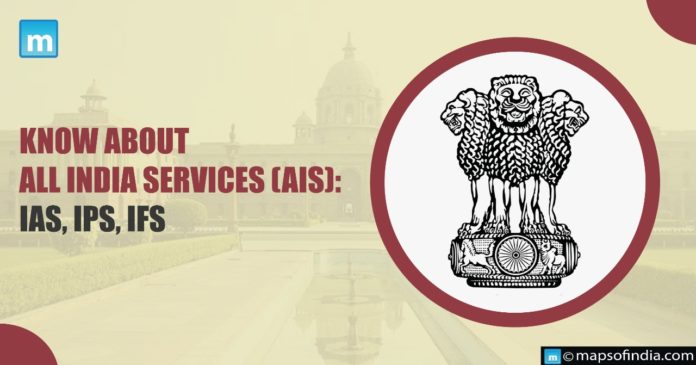The All India Services (AIS) include India’s three primary civil services:
- The Indian Police Service (IPS)
- The Indian Forest Service (IFS)
- The Indian Administrative Service (IAS),
The Centre (Union Government) enlists applicants for the All India Services as a distinctive characteristic of a federal system of government. The All India Services are operated under different State Cadres and are accountable to the state and the Center for their operations. Because of the country’s federal politics, this is seen as one of the methods that strengthen the Union Government over the state governments.
- The Civil Services Examination, administered yearly by the Union Public Service Commission (UPSC), is used to recruit IAS and IPS.
- The preliminary examination for IFS is merged with the Civil Services Test, whereas the following phases are held independently.
- The chosen applicants are appointed officials and prepared by the Central Government before being assigned to various State cadres.
Functions, Authority, Objective and Duties
- The authority, objective, and duties of these India Services are mentioned in the All India Services Act, 1951, which authorises the Government of India to make policies and guidelines for the service settings and recruitment of people appointed to All India Services with the discussions of state Governments.
- The All India Service (Conduct) Rules, 1968 oversee the All India Services and provide the standard of conduct for all Civil Servants.
Cadres
The country has 24 cadres, apart from three combined cadres:
- Manipur-Tripura cadre.
- Arunachal Pradesh-Goa-Mizoram-Union Territories (AGMUT) cadre.
- Assam-Meghalaya cadre.
- Besides being assigned to their respective states during their probationary period, AIS officials, who work for the Union Government, are also deployed on deputation.
- Most State Cadre Officials come from outside the state, while the remainder may be native residents.
- Once an officer gets assigned to a state Cadre, they are usually for the duration of their service.
- Candidates who are hired are assigned to different cadres and, if necessary, may be deputed to Central Government employment.
Let us briefly discuss each of the services:
Indian Police Services (IPS)
- An integral part of the All India Services, the Indian Police Service (IPS) is in charge of maintaining public order and providing domestic security.
- Following independence, the Indian Police Service replaced the Imperial Police (IP).
- The Indian Police Service is not a law enforcement organisation in and of itself. Still, it is the organisation to which all senior police personnel belong, regardless of the agency they serve.
Indian Forest Services (IFS)
- Candidates chosen for IFS receive training at the Indira Gandhi National Forest Academy. The officials are trained to the point that they are tough enough to operate in the country’s most severe terrains.
- To accomplish the duties of the Indian Forest Service, one must have strong technical knowledge as well as excellent administrative skills.
Indian Administrative Services (IAS)
- The Indian Administrative Service, with the IFS and the IPS, is one of three All-India Services.
- Candidates chosen as IAS Officers receive training in managing government issues. Every public servant is assigned to a particular office, with the primary job in that field being policy formulation and implementation.
- Policy concerns are framed, updated, and interpreted in this role with the Minister’s approval and under the close oversight of the Administrative Office. Policy implementation is also carried out on the officer’s suggestion.




